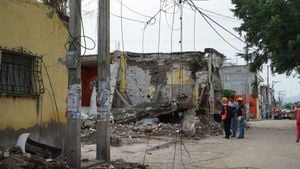International aid efforts are ramping up for Syria following the recent upheaval, signaling potential changes for the war-torn nation. The announcement came just days after the overthrow of long-term president Bashar al-Assad, with hopes pinned on new leadership.
Turkey has publicly declared its support for the newly established government, which comprises rebels who ousted Assad. Yasar Guler, Turkey's Defense Minister, stated, "Turquía está dispuesta a prestar el apoyo necesario si nos lo solicitan." This marks a shift for Turkey, which had previously navigated complex relations with Assad’s regime.
During his statement, Guler emphasized the need to provide the new administration with the opportunity to demonstrate its governance capabilities; he acknowledged the rebels' commitment to maintaining state institutions and working with international organizations.
On the international front, the UN has intensified its call for humanitarian assistance, following the dramatic changes within Syria. Geir Pedersen, the UN Special Envoy for Syria, highlighted the necessity of aid, stating, "Este cambio en sí mismo crea grandes esperanzas, pero todos sabemos que aún quedan muchos retos por delante." Pedersen underscored the importance of establishing accountability for past actions as Syria attempts to heal from years of conflict.
Pertinent to these discussions is the potential logistical aid efforts, including humanitarian assistance from Ukraine. President Volodymyr Zelensky announced on Sunday his country's readiness to provide food supplies, specifying offerings such as wheat, flour, and cooking oil derived from their grain initiative. "Ahora podemos ayudar a los sirios con trigo ucraniano, harina y nuestro aceite - nuestros productos que se utilizan en todo el mundo para garantizar la seguridad alimentaria," Zelensky stated, reinforcing Ukraine’s role amid the crises its own war has inflicted.
Pedersen and other officials stress the importance of addressing immediate humanitarian needs, ensuring services continue to function, and facilitating the return of refugees wishing to come home. Critical to this initiative is not just the inflow of aid, but the establishment of order and services to support the population's recovery.
The international community is eagerly watching as Syria evolves, with the hopes of many fixated on whether the new government can effectively lead its citizens out of desperation and chaos. The restored flow of international aid, partnered with local governance, symbolizes not only interest but also commitment to rebuilding the war-torn country.
The challenge stems from balancing immediate humanitarian needs and long-term stability, as officials reiterate the need for inclusivity within the political process — stressing it must be 'led by the Syrians'. The message remains clear: resolving the Syrian crisis requires unity among its people and the backing of the international community.
With various nations expressing their willingness to assist, the future of Syria hangs on the development of cooperative efforts and the restructuring of its political frontier. Observers around the world will continue to monitor these efforts closely, bearing witness to how international dynamics can pivot toward healing the wounds of war.
The community remains aware, as Pedersen noted, of the significance of not only aiding but rebuilding. The need for justice remains high on the agenda; the UN envoy reminded all parties involved to avoid impunity and revenge as recovery efforts commence.



